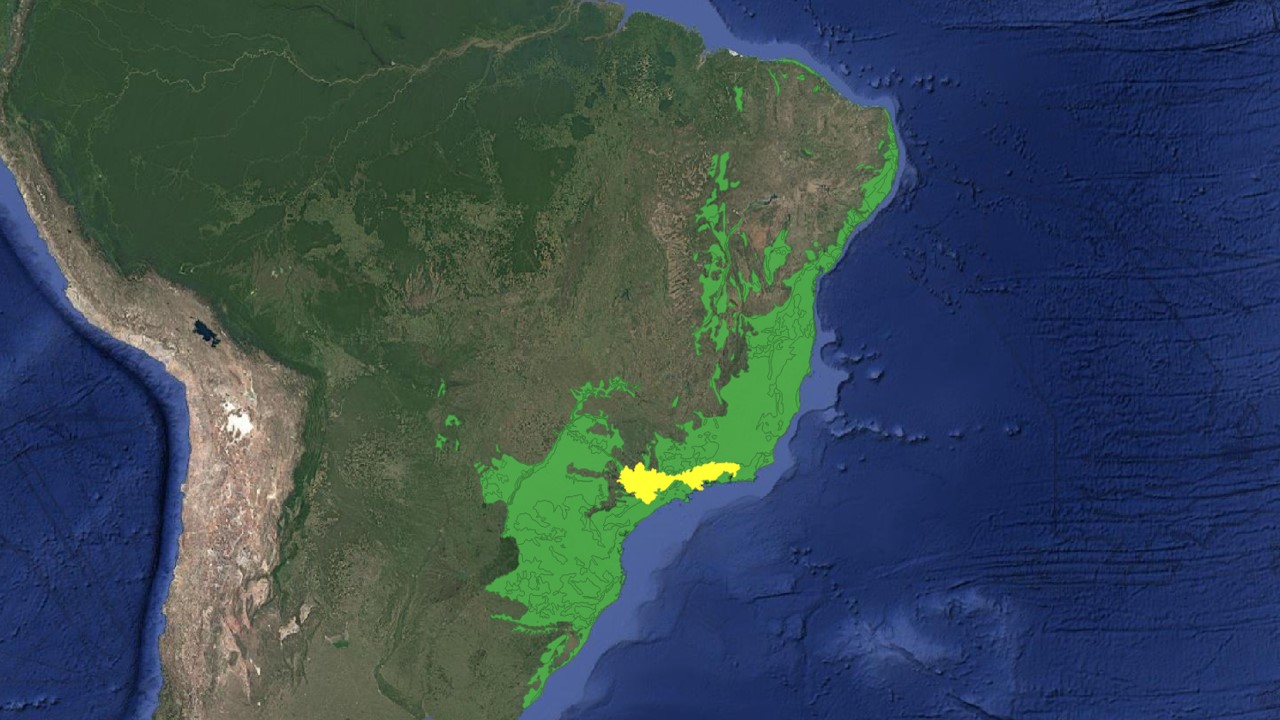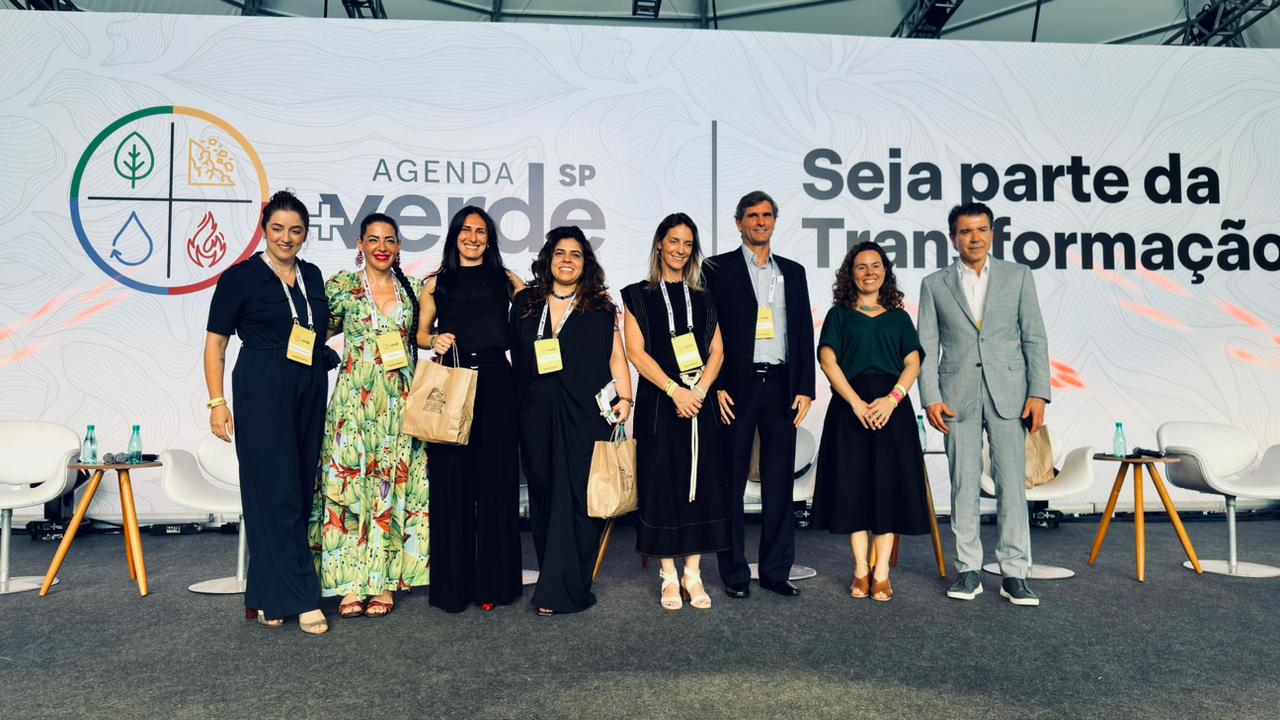Apoie nossas
causas
Se mantenha informado de nossas ações
05 de November de 2025
The SOS Mata Atlântica Foundation launched today, during the Agenda SP+Verde Summit—a pre-COP30 event held in São Paulo—the Atlantic Forest Alliance, a multi-sector coalition that mobilizes the private sector and institutional partners to invest in projects focused on conservation, restoration, and biodiversity protection within the biome. The initiative aims to serve as a model of coordination and engagement across different sectors, with a special focus on the Tietê and Paraíba do Sul river basins—strategic territories for the biome’s water and climate future.
The Atlantic Forest Alliance is the main business mobilization mechanism within the 2023–2030 Territorial Strategy of the SOS Mata Atlântica Foundation—a long-term, science-based plan designed to deliver measurable results in conservation, restoration, and environmental governance.
The Territorial Strategy focuses its efforts on three key pillars: Clean Water (ensuring water security and quality for millions of people), Biodiversity (protecting species and conserved areas), and Climate (mitigating emissions and adapting to extreme weather events). These actions contribute to Brazil’s international commitments under the Paris Agreement, the Sustainable Development Goals (SDGs), and the Global Biodiversity Framework (GBF).
Using geospatial intelligence and analysis to identify priority areas, the plan aims, by 2030, to directly restore 5,000 hectares and move toward zero deforestation in the Médio Tietê and Médio Paraíba do Sul basins. The Foundation has already invested around BRL 150 million in various initiatives in the territory and aims to mobilize an additional BRL 350 million—totaling half a billion reais by the end of the decade.
“The Alliance is born as a movement of shared responsibility. It symbolizes the collective strength we need to care for the Atlantic Forest—a biome vital for Brazil’s climate, water, and economy. We are bringing together partners who not only invest but also share a long-term vision of transforming a challenging territory into a model of sustainability and development,” said Luís Fernando Guedes Pinto, Executive Director of the SOS Mata Atlântica Foundation.
A priority and replicable territory
The Médio Tietê and Médio Paraíba do Sul river basins—covering 5.5 million hectares and spanning 170 municipalities across São Paulo, Rio de Janeiro, and Minas Gerais—reflect Brazil’s reality: regions with high population and economic density, but also significant environmental pressures.
These areas host 12 million inhabitants, face strong demands for water and energy, and suffer from severe forest fragmentation—conditions that make an integrated approach to restoration, governance, and sustainable development urgent.
The territory also includes iconic Conservation Units such as the Serra da Bocaina and Itatiaia National Parks, the Ipanema National Forest, and the Cairuçu Environmental Protection Area, along with thousands of rural properties with potential for ecological and productive recovery. In Permanent Preservation Areas (APPs) along rivers and waterways alone, the restoration potential exceeds 300,000 hectares.

In yellow, the territory of the strategy; in green, the original area of the Atlantic Forest biome in Brazil.
Business cooperation and regional impact
The Alliance brings together companies that are already partners of SOS Mata Atlântica in various initiatives and maintain mid- and long-term commitments to the conservation of the biome: CMA CGM (Logistics), HEINEKEN Group (Beverages), Itaúsa (Finance), MOL Impacto (Communications), Motiva (Infrastructure), Salesforce (Technology), Scania Latin America (Transport), Sol de Janeiro (Cosmetics), União Química (Pharmaceuticals), and Ypê (Cleaning and Hygiene).
Over the past few years, SOS Mata Atlântica and its partners have continuously invested in the region. Combining the Foundation’s own initiatives and joint projects, the accumulated investment has already reached BRL 150 million, encompassing restoration of degraded areas, creation and management of Conservation Units, environmental education, and public policies related to water and biodiversity.
“With the new Alliance, our goal is to create a cooperative environment in which private investment can generate collective and lasting benefits—strengthening restoration supply chains, fostering green jobs, and scaling up nature-based solutions,” said Carlos Abras, Business and Resource Mobilization Manager at the SOS Mata Atlântica Foundation.
Beyond supporting global targets for climate, water, and biodiversity, the Alliance enables companies to reduce socio-environmental and economic risks, strengthen their ESG credentials, and collaborate on an agenda that links environmental impact with sustainable development.
Impact indicators will include restored area, carbon sequestration, water quality, ecological connectivity, and green job creation.
“We want the Atlantic Forest Alliance to become a benchmark for collective action and innovation—demonstrating that conserving and restoring nature is also an agenda for development and prosperity,” added Carlos Abras.
Collaboration between companies and government for the Atlantic Forest
During the Agenda SP+Verde Summit, the launch of the Atlantic Forest Alliance was strengthened by a panel that brought together public and business leaders around a shared goal: transforming conservation and restoration of the Atlantic Forest into drivers of sustainable development, water security, and regional prosperity.

Moderated by Roberta Faria, CEO of MOL Impacto, the panel featured Natália Resende, Secretary of Environment, Infrastructure, and Logistics of the State of São Paulo (Semil); Waldir Beira Júnior, CEO of Ypê; Natalia Cerri, Manager at Instituto Itaúsa; Lígia Camargo, Sustainability Director at HEINEKEN Group; Juliana Maria da Silva, Sustainability Director at Motiva; and Katerina Elias-Trostmann, Director for Climate and Nature at Salesforce Latin America.
The discussion emphasized cross-sector collaboration and the need to unite science, public policy, and private investment to scale up restoration and conservation of the biome.
“I strongly believe in the power of partnerships—organizations bring expertise that companies alone do not have. We’re very proud to be part of the Alliance and contribute to improving climate, water, and the biome in Brazil. Longevity is key for any project to deliver real impact,” said Waldir Beira Júnior, CEO of Ypê.
Since 2007, Ypê has been a long-standing partner of the Foundation, having planted over 1.2 million trees and consistently supported the Observando os Rios (“Watching the Rivers”) program, which mobilizes around 2,000 volunteers to monitor water quality in over a hundred rivers within the Atlantic Forest.
“When we work together with other companies, we can generate much greater impact. We are very happy with this alliance,” said the Salesforce representative. “The Atlantic Forest has tremendous potential for forest restoration, protection of water springs, and improvement of air quality—and above all, for multiplying impact through collective effort.”
The panel highlighted that integrating sustainability into the core business strategy is the only way to secure companies’ long-term future.
“The climate changes we’re experiencing today are the result of production and consumption choices made over time. We must rethink these models. HEINEKEN believes in initiatives that foster a joint approach among companies, society, and government—so our impacts can become increasingly positive,” said Lígia Camargo.
According to Natalia Cerri, from Itaúsa, the Alliance provides the space needed to do what climate and biodiversity action most require: move from theory to practice by testing governance and financing models that integrate conservation and development.
“The private sector’s presence is essential because it’s in this convergence that we can create solutions that make sense—productively, economically, and environmentally—paving concrete pathways to a more positive economy for climate, nature, and people,” she said.
Juliana Silva, from Motiva, added that biodiversity preservation is central to building effective solutions for addressing the increasing frequency of extreme climate events. It is also fundamental for making cities and businesses more resilient to ongoing climate change.
“By joining the Atlantic Forest Alliance—a biome that is strategic for Motiva’s operations—we reaffirm our commitment to environmental protection around our assets and advance our biodiversity agenda. This initiative aligns with our goal to ensure that our impacts are fully offset by conservation and forest restoration actions, following the ‘no net loss’ principle,” she explained.
Natália Resende closed the panel by celebrating the collaboration among sectors in favor of the biome:
“The Atlantic Forest Alliance plays a fundamental role. It brings together a great diversity of actors, and that is essential to move the environmental agenda forward. We are honored to be part of this collective effort.”